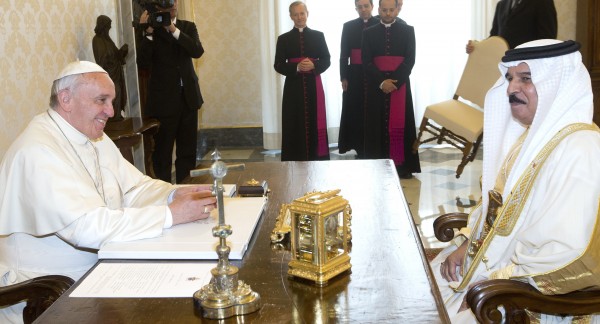About Tolerance: Why Can't the Pope Meet with Shiite Spiritual Leader in Bahrain?

2022-10-15 - 8:28 p
Bahrain Mirror (Exclusive): In March last year, during his visit to Iraq, His Holiness the Pope met with religious leaders, including the supreme religious authority Sayed Ali Al-Sistani, but would he do the same in Bahrain?
It is certain that His Holiness Pope Francis will not have the opportunity to meet with the spiritual leader of the Shia community, Ayatollah Sheikh Isa Qassim, during his visit to Bahrain next month, because the Sheikh Qassim, in short, has been living in exile for more than 4 years.
Sheikh Qassim was deported from the country in 2018, more than a year after he was placed under house arrest, as part of a sectarian security crackdown by the government imposed on Shiites, who led the protests witnessed in Bahrain nearly a decade ago, demanding a democratic shift in power.
Qassim is considered one of the founders of the state following the independence, as he was among the members who were popularly elected to pen the country's first constitution, but this did not spare him from a smear campaign that ended with his deportation.
Attacks to disperse supporters who were staging a sit-in around his home in Diraz, west of the capital Manama, killed five youths and injured dozens; however, this did not even trigger the Interior Ministry to launch any investigation into the circumstances of their deaths.
Shiites have long complained of sectarian persecution at the hands of the minority, the ruling Al Khalifa family, that holds control over the country's decision-making, power, and wealth.
Meanwhile, the ruling family is trying to use the Pope's visit to whitewash its sectarian persecution of the Shiite majority. The family believes the Pope's visit to the country could hide its black record when it comes to religious rights and freedoms.
It is also betting on the fact that the government could appear in a better light, seeming more tolerant of different religions such as Christianity, Buddhism and other religions to which many migrant workers belong.
The announcement of the Pope's visit came at a time when prominent cleric Ayatollah Sheikh Abduljalil Al-Meqdad declared that he had been assaulted by guards in prison, where he is serving a life sentence, and insults were directed against his sect.
The Bahraini security forces have always targeted Shiites, including in ways that expressed contempt for their faith and religious symbols, according to the report of a commission of inquiry appointed by the king, reports by the US State Department and international human rights organizations on religious freedom.
Dialogue with whom?
According to the Vatican, the Pope is supposed to participate in a dialogue forum held by the government on coexistence, and visit the capital Manama and Awali region, which is located south of Bahrain.
While the government invites the Pope to participate in the "Bahrain Forum for Dialogue: East and West for Human Coexistence" as Bahrain called it, it refuses to engage in any dialogue aimed at resolving any of the country's crises.
Opposition groups led by Al-Wefaq National Islamic Society have always reiterated their calls for a political dialogue that could put an end to the country's conflict that has been ongoing for more than a decade, but the government refuses to respond.
Manama Visit
It is not yet known what landmarks the Pope will see in the capital Manama, which he will visit in a three-day trip to Bahrain, as Manama is witnessing attempts to undermine its demographic identity, of which Shiites are the main pillar.
In order to portray the government as tolerant of Judaism, reports have revealed its desire to Judaize entire neighborhoods in the capital by expelling Shia residents and pressuring them to sell their properties there.
The Ministry of Culture has also drawn up a map of key areas in the capital Manama where no Shia monument or house of worship has been included, even though there are more than 100 obsequies and archaeological mosques in Manama for the indigenous citizens.
Why Awali?
As for Awali's visit, the Pope is expected to visit Our Lady of Arabia Cathedral, the largest Catholic church in the Gulf, which the government inaugurated last December.
This comes as part of an effort to polish its image after demolishing more than 45 Shia mosques and obsequies as part of its latest crackdown on the Shia population.
Coexistence is an inherent feature of Bahraini society before King Hamad bin Isa Al Khalifa was crowned some 20 years ago, who has worked to ignite a conflict of identities among the same society instead of promoting a state of human coexistence.
The king deliberately sparked a Sunni-Shia conflict as part of his tactics to counter the country's 2011 political protests, but Shia opposition leaders blocked those efforts.
The Sacred Heart Church is still found in the middle of Shiite obsequies in the capital Manama as a manifestation of the coexistence that the indigenous citizens enjoy and the ruling family lacks.
- 2022-11-08A Word of Truth about the Pope of the Vatican
- 2022-11-04Death Row Prisoner Mohammad Ramadan Pleads with Pope to Aid his Release
- 2022-11-04Al-Wefaq Adresses His Holiness the Pope: Bahrain Suffers Crisis, Oppression and Intolerance
- 2022-11-04In Bahrain, Pope Speaks out against Death Penalty and Discrimination: Reuters
- 2022-11-03Pope Francis Calls for End to Death Penalty and Religious Discrimination in Bahrain Visit